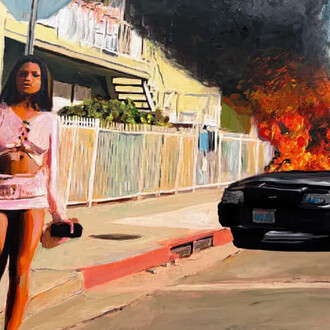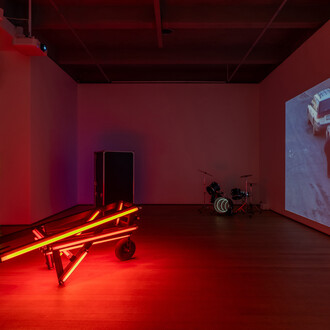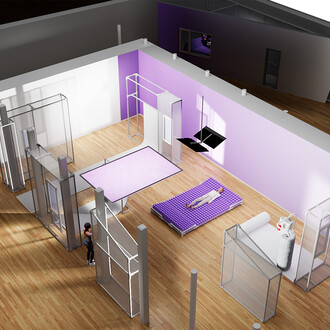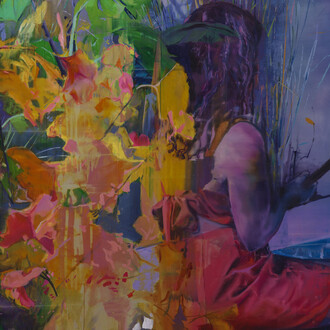Pipo Nguyen-duy moved to the United States in 1975 as a Vietnamese refugee. Consequently, cultural identity and cultural authenticity are ongoing themes in all of his artwork. The artist writes: “[S]ite-specificity has been an integral part of my studio practice, as I always consider geographical, historical, and cultural significance of the locations in my research.”
For “Hotel Window,” Nguyen-duy rented the same sixty-four square-foot room in Ho Chi Minh City, District 1, over the course of several trips to Vietnam from 2015 to 2017. For close to six months he photographed obsessively from dawn until deep into the night, breaking only for food and sleep. “The second-floor window offered a commanding view of the alley where it widened” before it narrows at a sharp left turn located under the hotel. The alley serves as a shortcut between a congested street where it begins and a crowded market where it terminates on the other end. The artist’s lens sat witness to all of the human traffic and adventures that unfolded before its steady gaze.
Nguyen-duy’s goal was to be as objective as a scientist gathering visual data. He set up his tripod in the same position day after day, month after month, careful to capture precisely the identical slice of view.
“With this work, I aim to document, as if from the perspective of a natural scientist or archeologist. Using the camera to record facts rather than regarding it as a subjective tool, I have become increasingly intrigued with the idea of mapping my ‘own’ culture in hopes of understanding it from an outsider’s point of view using the hotel room as a metaphor for an in-between place. The window curtain was the variable that changed, in addition to the light, which also varied throughout the day. The curtain was a literal veil to the world and the culture outside my window. It serves as a metaphor for the lack of clarity and insight that I may have of my culture. From the alley I am hidden or visible depending on how wide the curtain was kept and the time of the day. The neatly arranged architecture seen from my window illustrated the rich history and the complex transition of the Vietnamese culture from French colonial, to American modernist, to contemporary high-rise.
“The project began as a survey to categorize different types of people, record gestures and behavior, map traffic patterns, and capture ‘decisive’ moments of street scenes below. Conceptually, I intended this mapping project only to reveal my difficulties of defining home—however as the project grew, the complexities of the images also have become more layered. The first image of the series revealing a man masturbating at 6:00 a.m. while leaning against his scooter below the hotel window addresses the voyeuristic nature of the project. In one set of pictures, which followed my neighbors’ gestures and habits from dawn until dusk, day after day, the project’s surveillance technique questions the tension between private and public spaces. In another image, a group of scantily-clad fashion models head toward an older woman in traditional clothing with a straw hat. This image aims to document the dynamic social changes and conflicts in contemporary Vietnam. Inasmuch as it is a project about the nuances and complexity of contemporary Vietnam, ‘Hotel Window’ is also about the photographer’s struggle to find his place within the culture.”
Pipo Nguyen-duy was born in Hue, Vietnam. Growing up within thirty kilometers of the demilitarized zone of the 18th Parallel, he describes hearing gunfire every day of his early life.
Nguyen-duy has taken on many things in life in pursuit of his diverse interests. As a teenager in Vietnam, he competed as a national athlete in table tennis. He also spent some time living as a Buddhist monk in Northern India. Eventually Nguyen-duy earned a Bachelor of Arts degree in economics at Carleton College. He then moved to New York City, where he worked as a bartender and later as a nightclub manager. Finally, Nguyen-duy earned a Master of Arts in Photography, followed by a Master of Fine Arts in Photography, both from the University of New Mexico at Albuquerque.
Nguyen-duy has received many awards and grants including a prestigious Guggenheim Fellowship in Photography; a National Endowment for the the Arts; an En Foco Grant; a Professional Development Grant from the College Arts Association; a National Graduate Fellowship from the American Photography Institute; a Fellowship from the Oregon Arts Commission; a B. Wade and Jane B. White Fellowship in the Humanities at Oberlin College; and three Individual Artist Fellowships from the Ohio Arts Council. He participated as an artist-in-residence at Monet’s garden through The Lila Wallace-Reader’s Digest Artists at Giverny Fellowship; as an artist-in-residence at the Headlands Center for the Arts in Sausalito, California; and participated in Light Work’s Artist-in-Residence program.
Nguyen-duy has lectured widely and his work is part of many public collections in the United States, Europe, and Asia. He is currently a professor teaching photography at Oberlin College in Oberlin, Ohio.
















